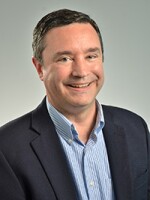On Wednesday’s Central Standard, special guest host Brian Ellison talks with psychologist Dr. Bruce Liese about the meaning of work.
Why do we work? Are we searching for more than a job, more than a paycheck? How does one find their “calling?” Plus, we’ll discuss the role that the modern-day office job plays in the development of personal relationships.
GUEST:
Dr. Bruce Liese, KU Family Medicine
FROM DR. BRUCE'S NOTEBOOK:
I. Why do people choose to work? Is it a psychological need? Are they searching for more than a job in the workplace? Is working a natural human drive or something thrust upon us by our environment? What’s a “calling” and how does someone realize their calling?
- Those who work seek satisfaction in at least five areas:
- The intrinsic nature of the work itself (the degree of challenge, stimulation, importance)
- Relationships (with co-workers, customers, clients, community, etc.)
- Compensation and benefits (wages/salary/pay/vacation/insurance/etc.)
- Opportunities for advancement (increased autonomy, authority, responsibility)
- Opportunities for personal growth (typically through supervision, training, experience)
- The needs met through work are both innate and imposed upon us by the environment
- From early childhood kids engage in productive (work-like) behavior. As evidence just watch kids play with Legos, building blocks, cardboard appliance boxes turned into fortresses. Just because they make it look fun ("child's play") doesn't mean it isn't work.
- A desire for relationship and personal growth appears to be innate while the need for compensation and benefits appears to be a function of the environment we live in.
- A "calling" is when work aligns with a sense of personal meaning, is motivated by pro-social values, and arises in response to a transcendent summons.
- Having a calling correlates with favorable work outcomes such as job satisfaction, career commitment, organizational commitment, work meaning, and lower withdrawal intentions.
- Living out, fulfilling, manifesting a calling requires focus, discipline, and overcoming barriers.
- Those who realize that they won't fulfill their calling may experience a more intense remorse, regret that those who never felt they had a calling.
II. What role does work play in forming mentorships, friendships and romantic relationships?
- For most employees the work environment is where they spend the most time with others.
- Friendships and romantic relationships are formed in the workplace.
- There's also potential for unhealthy relationships to form at work
III. Is a JOB the same as a CAREER? Since the answer is "no," what's the difference between the two?
- A job is an activity done in exchange for money. It may or may not be consistent with one's career or calling.
- A career is the unfolding sequence of a person’s work experience over time.
- Why is this distinction important? Because it's important for individuals to consider their "lifework" (i.e., career) while in the process of seeking any job.
IV. Why do so many people dislike or even hate their jobs?
- As in romantic relationships, job seekers tend to idealize potential jobs, especially if they're unemployed or unhappy at their present jobs. During the courtship phase they may deceive themselves by thinking, "I'd love do that job!" "I'd love to work for this company!" "I'd be great at that job." When these things aren't true.
- The Peter Principle: Getting promoted from a job you love to a job you don't do well and may learn to hate.
- The fit between a person and his or her work environment will impact job satisfaction. According to a prominent theory of job satisfaction there are five main categories of job types:
- Realistic – Works with their hands (e.g., craftsmen and women)
- Investigative – Dedicated to data, science
- Artistic - Creative
- Social – People and relationships are important
- Enterprising – Very complicated – not just about money.
- Conventional – Profound focus on organization and structure.
- To the extent that individuals’ personalities are well matched to the types of work they choose they will be satisfied. For example, an artistic person working in an artistic job is much more likely to be satisfied that an artistic person engaged in more conventional work (e.g., filing or being a long distance trucker).
V. What courses of action are available to those who hate their jobs?
- Quitting with no safety net (not a good option).
- Rebounding: Jumping right from one bad job to another.
- Making a half-hearted effort at your old job (i.e., slacking) while seeking a new more fulfilling job.
- Doing your best at your old job while actively self-examining and seeking a better fit at another job.
VI. How do you know what kind of work you will love? What if you can't think of a single job you might love?
- Use your imagination, early life experiences, weekends.
- Remember that finding your life's work does not typically involve instant gratification.
- Ask others what you do well.
VII. What's the difference between UNemployment and UNDERemployment?
- Unemployment is typically an acute problem causing acute pain.
- Underemployment typically involves a more chronic problem that takes place while a person is employed.
VIII. What role does money actually play?
- People assume that it buys happiness but it does not.
- The absence of money may lead to suffering but wealth absolutely does not create happiness or joy.



